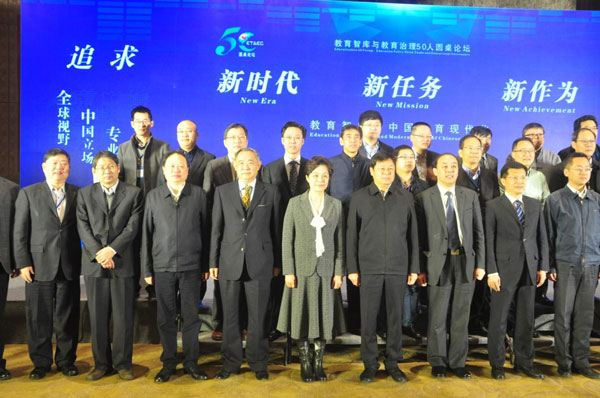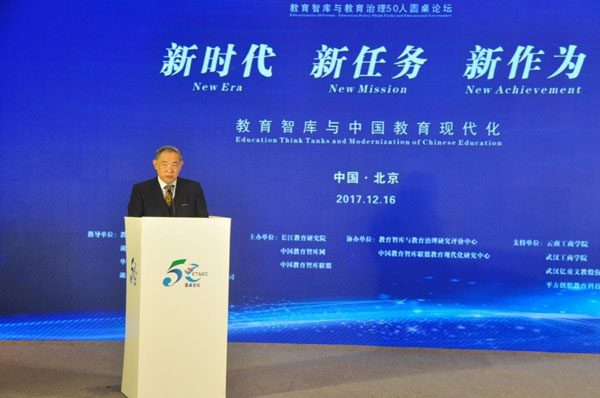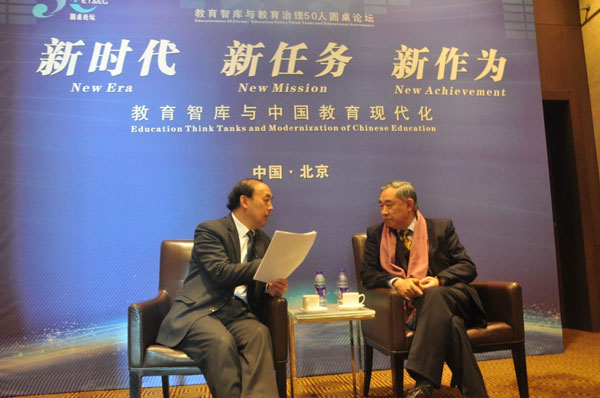
The first Educationist 50 Forum: Education Policy Think Tanks and Educational Governance was co-held by Changjiang Education Research Institute, China Thinktanks, and China Education Think Tank on 16 Dec, 2017 in the Hilton Hotel Beijing.

Theming on “New Era, New Mission, New Achievement: Education Think Tanks and Modernization of Chinese Education”, the forum focused on the following hotspot issues: “the spirit of the 19th National Congress of CPC” and “Education Think Tanks, Education Governance, and Modernization of Chinese Education” to better implement the results of the 19th National Congress and push forward the research of education governance and development of education think tanks. Over 200 school principals and experts from the Ministry of Education, university think tanks and schools, education theorists and practitioners who have longtime followed the development of Chinese education think tanks gathered in the forum. They elaborated their understanding of the spirit of the 19th National Congress and the Modernization of Chinese education, and pulled their wisdom for future education reform and building a powerful country in education.

Mr. Li Ruohong, president of China World Peace Foundation, Mr. Tao Kaiyuan, vice-chairman of the Central Committee of the China Association for Promoting Democracy and deputy president of the Supreme People's Court, Mr. Tao Hong, head of the Education Department of Hubei province, Mr. Chen Yiguo, chairman of Hubei Changjiang Publishing & Media Group (Stock) Co., Ltd., Mr. Peng Nansheng, vice-president of the Central China Normal University extended their congratulations to the opening of the forum and made remarks. Mr. Li Ruohong said, “Education not only symbolizes the progress of civilization, but also reflects the comprehensive national power. After 40 years of reform and opening up, China’s economic status and power of political discourse has attracted worldwide attention. Now the international community is paying attention to our educational and social reform, and the approaches we take in improving our basic and social education. To this end, I had put forward the Peace+1 proposal (including Peace + Education) in the UN headquarters and launched and developed the Interactive Atlas of Cultural Interactions along the Silk Roads project together with UNESCO in the UN’s 193 member states. The project is well planed, pragmatic and applicable. It is regarded by Mr. Guterres, the Secretary General of the UN, as a contribution to the world”. Li also shared his experience in conducting social and life-long education, his understanding of Mr. Tao Xingzhi’s educational thought “life is education, society serves as a school”, approaches of connecting traditional view of time and space with modern innovation, and of combining theory with practice to develop practical and sustainable intermediate. He also talked about striking a balance between nations and regions that have different social systems, religions, cultures, and values and turning the understanding of such balance into pragmatic policies for global and regional governance, and offering Chinese approaches in improving international order. Li, in the end, hoped that people presenting in the forum could challenge themselves, face the future, and demonstrate Chinese wisdoms and China’s power in attracting talents.

Mr. Du Zhanyuan, vice minister of education, delivered a keynote speech on Artificial Intelligence and the Revolution of Future Education. He said, “In the new era, the essential feature of education will be its deep integration with the information technology. The previous industrial revolutions replaced or improved the efficiency of labor work. Now we are witnessing a new revolution, and facing the challenge it brings requires the joint efforts of educators, technologists, scientists, and entrepreneurs”. Mr. Zhou Hongyu, deputy director-general of the People’s Congress Standing Committee of Hubei Province and president of Changjiang Education Research Institute made an address on The Building of Think Tanks – A Support to the Modernization of Chinese Education. He said, “The Party Central Committee lets think tanks serve in five aspects, policy advisory, theoretical innovation, public opinion guidance, public diplomacy, and social services. Think tanks serve as a brain trust and talent pool. They shall be regarded as a whole entity”. On the forum, the Changjiang Education Research Institute published its latest research results – Index of the Modernization of Chinese Education, the first systematic research report on the Chinese education modernization.
During the forum, Li Ruohong and Zhou Hongyu discussed about enhancing strategic cooperation, promoting international education exchanges and building educational think tanks that have international influence, and improving the global competitiveness of Chinese educational think tanks.
- Peace Garden Civil Diplomatic Trip to Commemorate the 80th Anniversary of the Anti Fascist War Victory
- Li Ruohong attended the 9th FIAP Photo Meeting
- China Pakistan Civil Diplomacy Jointly Building Silk Road Corridor at Peace Garden Museum
- Li Ruohong attended the 1st Pakistan Mango Festival
- Peace Garden Community held a concert to commemorate the 80th anniversary of World Anti Fascist Day
- Li Ruohong talks about regional peace during Singapore's National& Military Day
- Li Ruohong attended in Moroccan embassy event to promote civil diplomacy and economic interaction
- Peace Garden signs up for the China-Pakistan "Belt&Road" peace and public welfare new momentum
- Li Ruohong discusses peace&public welfare with Austria's new cultural counselor
- Sino-US Civil Diplomacy: Sino-US Aviation Heritage Foundation signs MOU in Peace Garden
- The 11th Peace Garden Peace Festival promotes peaceful development through diversity dialogue
- Beijing Peace Health Development Center holds international self-care day activities
- The 50th Session of UN Human Rights Council Parallel Event was held at Peace Garden Museum
- The South Korean Political Counsellor of the Embassy Visited Peace Garden for Talks
- Li Ruohong attended Online 2021 Forum on Cooperation between China and Pakistan Provinces and Cities
- "Health with Boundless Heart" International Self-Care Day Event Held at Beijing Peace Garden Museum on July 24, 2021
- Peace Garden held the side event of the UN Human Rights Council 47th session
- Li Ruohong's Suggestions from His Interview on the Museum City Forum
- Dr. Li Ruohong delivered a speech on the 2nd Online Meeting of the International Network of the Silk Roads Programme, UNESCO
- Li Ruohong talks on National Affairs Forum about foreign-invested enterprises to promote

